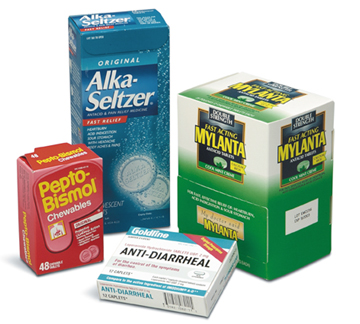- Limit your intake of alcoholic beverages. Consumption of alcoholic beverages can worsen heartburn and diarrhea. Persons with alcohol-induced liver and pancreatic disease are at risk for recurrent symptoms if exposed to even small amounts of alcohol. It is very important that you resist the temptation to drink during the holidays and all other celebratory times. It can be helpful to avoid situations in which alcoholic beverages will play a large part in the celebration. Involving a sponsor or counselor can help. Of course, never drink and drive!
- Don't overdo it. Stress can have a major impact on digestive diseases. For example, increased stress can trigger a flare in Crohn's disease, colitis, and irritable bowel syndrome. Try to minimize stress as much as possible. Don't take on more things than you can handle. Get sufficient sleep.
- Know when to self-medicate and when to seek advice. Symptoms for some digestive disease can be treated with over-the-counter medications. Antacids (for example, Tums and Maalox) and H2 blockers (for example, Zantac and Pepcid AC) can be used for breakthrough heartburn symptoms. Imodium can be used to treat diarrhea in irritable bowel syndrome. In other cases, self-treatment is not recommended; see your health care professional.
- An ounce of prevention. Monitoring for potential problems is also important in digestive health, but even more so during the holidays. For patients with cirrhosis, checking body weight daily is very important. An increase of three pounds or more can be a sign of fluid overload. Informing your medical provider of such an increase in body weight can prevent an unnecessary visit or hospital stay. Patients with cirrhosis can also experience confusion (heptic encephalopathy) triggered by excess protein intake. Persistant diarrhea and/or rectal bleeding can be a sign of a flare of Crohn's disease and colitis. Alert your health care provider to these symptoms promptly for appropriate management.
12.22.2010
Weekly Health Tip: Digestive Health during the Holidays, Part II
And now, here are the remaining four digestive health tips for the holiday season. Keep your insides all clean for the New Year!
Labels:
Weekly Health Tip


No comments:
Post a Comment